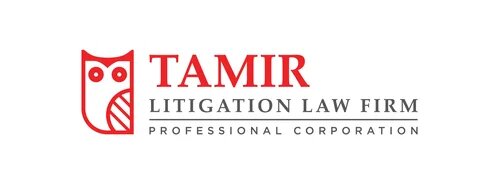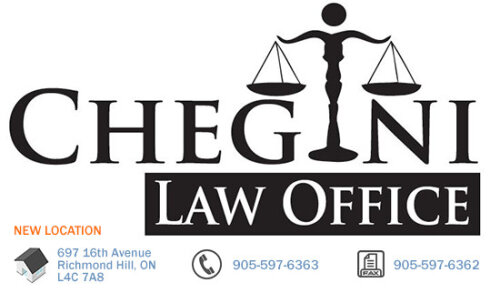Best Lawsuits & Disputes Lawyers in Richmond Hill
Share your needs with us, get contacted by law firms.
Free. Takes 2 min.
List of the best lawyers in Richmond Hill, Canada
Canada Lawsuits & Disputes Legal Articles
Browse our 1 legal article about Lawsuits & Disputes in Canada written by expert lawyers.
- Small Claims Court in Ontario Canada - Guide & Process FAQ
- The financial limit for filing a lawsuit in Ontario Small Claims Court is $35,000 CAD, excluding interest and court costs. Plaintiffs generally have exactly two years from the date the dispute arose to file their claim under the Ontario Limitations Act. Winning a judgment does not mean the court will... Read more →
About Lawsuits & Disputes Law in Richmond Hill, Canada
Lawsuits and disputes law in Richmond Hill, Canada, covers a broad range of legal situations where individuals, businesses, or organizations have a disagreement that requires legal resolution. Richmond Hill, as part of Ontario, operates under Canadian federal and provincial law. Disputes can relate to contracts, property, employment, personal injury, or even family matters. Courts, such as the Ontario Superior Court of Justice and the Small Claims Court, help resolve these matters, sometimes through court proceedings, but often through mediation or settlement negotiations before reaching trial.
Why You May Need a Lawyer
Many situations can require legal assistance in lawsuits and disputes. Common circumstances include breach of contract, unpaid debts, landlord-tenant conflicts, disagreements over wills and estates, workplace disputes such as wrongful dismissal, construction disputes, and personal injury claims (like slip and falls or motor vehicle accidents). Even seemingly minor disagreements can become complex due to the legal process involved. A lawyer helps you understand your rights, navigates complicated legal procedures, represents your interests, and works to achieve the best possible outcome-whether through negotiation, mediation, or in court.
Local Laws Overview
In Richmond Hill, lawsuits and disputes are governed by Ontario law. The local court system is comprised of various levels, including Small Claims Court (for claims up to $35,000) and the Superior Court of Justice for larger or more complex matters. Key provincial statutes include the Ontario Rules of Civil Procedure, Limitations Act (setting timelines to commence legal proceedings), and specific laws related to contracts, employment, or property. Many disputes encourage or require pre-trial mediation or settlement discussions before they are eligible for trial. Richmond Hill also follows the Ontario Civil Court structure, and legal professionals in the area are regulated by the Law Society of Ontario.
Frequently Asked Questions
What is the process for starting a lawsuit in Richmond Hill?
To begin a lawsuit, you must file a claim in the appropriate court-Small Claims Court for smaller matters or the Superior Court for larger or more complex disputes. This includes preparing a statement of claim, serving it to the opposing party, and following the necessary court procedures and timelines.
How long do I have to start a lawsuit?
In most cases, you have two years from the date you discover (or should have discovered) the issue to start a lawsuit, according to Ontario’s Limitations Act. However, specific situations may have different time limits, so consulting a lawyer is essential.
Can I resolve a dispute without going to court?
Yes, many disputes in Richmond Hill are settled before reaching court through negotiation or mediation. Courts often encourage or require parties to attempt resolution outside of traditional litigation to save time and costs.
What is Small Claims Court?
Small Claims Court is designed for civil disputes that involve up to $35,000. It is a simpler, more accessible process for resolving issues like unpaid debts, breach of contract, or property damage.
Do I need a lawyer for Small Claims Court?
While not required, having a lawyer or paralegal can help you prepare your case, present evidence, and navigate the rules of procedure, increasing your chances of a successful outcome.
How much does it cost to sue someone?
Costs include court filing fees, service fees, and potentially legal representation. Legal fees will depend on the complexity of your case and the lawyer’s rates. Some lawyers offer contingency or flat fee arrangements for certain cases.
What if I am sued-what should I do?
If you are served with a claim, do not ignore it. Read the documents carefully, note any deadlines, and consult a lawyer to understand your rights and options for response, including filing a defense.
Is mediation mandatory in Richmond Hill?
In many civil cases in York Region (which includes Richmond Hill), mediation is mandatory before trial. Mediation can often lead to a faster, less expensive, and mutually agreeable resolution.
What types of disputes are common?
Common disputes include contract disagreements, property or boundary disputes, landlord-tenant issues, employment conflicts such as wrongful dismissal, wills and estates challenges, and personal injury claims.
How can I enforce a judgment?
If you win a case and the other party does not comply with the judgment, you may need to take further legal action to enforce it. This may involve garnishing wages, seizing assets, or seeking a writ of seizure and sale through the court.
Additional Resources
If you require legal assistance or more information about lawsuits and disputes in Richmond Hill, these resources may be helpful:
- Law Society of Ontario - Offers lawyer and paralegal directories, provides information on legal rights, and manages complaints against legal professionals.
- Ontario Ministry of the Attorney General - Provides guides, court locations, and instructions on court procedures.
- York Region Community Legal Clinic - Offers free or low-cost legal services to eligible individuals in Richmond Hill and the region.
- Ontario Small Claims Court - User-friendly resources for starting and responding to small claims.
- Community Mediation York Region - Free or affordable mediation services for local disputes.
Next Steps
If you need legal assistance with a lawsuit or dispute in Richmond Hill, consider the following steps:
- Identify and document your issue, with as much detail and supporting evidence as possible.
- Consult a qualified lawyer, paralegal, or legal clinic familiar with lawsuits and disputes in Ontario.
- Ask about your options for resolution, including negotiation, mediation, or formal court proceedings.
- Note and adhere to all deadlines for filing claims or responses to avoid losing your right to proceed.
- Understand the costs, timelines, and potential outcomes before making decisions.
- Follow your legal representative’s advice and the court’s procedures carefully.
Lawzana helps you find the best lawyers and law firms in Richmond Hill through a curated and pre-screened list of qualified legal professionals. Our platform offers rankings and detailed profiles of attorneys and law firms, allowing you to compare based on practice areas, including Lawsuits & Disputes, experience, and client feedback.
Each profile includes a description of the firm's areas of practice, client reviews, team members and partners, year of establishment, spoken languages, office locations, contact information, social media presence, and any published articles or resources. Most firms on our platform speak English and are experienced in both local and international legal matters.
Get a quote from top-rated law firms in Richmond Hill, Canada — quickly, securely, and without unnecessary hassle.
Disclaimer:
The information provided on this page is for general informational purposes only and does not constitute legal advice. While we strive to ensure the accuracy and relevance of the content, legal information may change over time, and interpretations of the law can vary. You should always consult with a qualified legal professional for advice specific to your situation.
We disclaim all liability for actions taken or not taken based on the content of this page. If you believe any information is incorrect or outdated, please contact us, and we will review and update it where appropriate.
Browse lawsuits & disputes law firms by service in Richmond Hill, Canada
Richmond Hill, Canada Attorneys in related practice areas.











